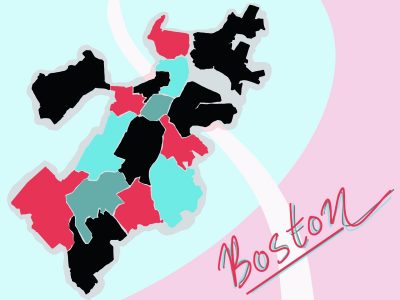Forget New York and Paris — the next city TikTok is fixated on is our very own Boston. From restaurant recommendations to curated clips of Boston’s prettiest areas, the historic city has been steadily populating “For You Pages” this winter. But in a city where over 20% of the population is college students, it’s inevitable that this burst of attention has been met with scholarly debate.
A TikTok account called @cornersofboston — which shares tourist recommendations around the city — posted a video this January titled “POV: Your sign to move to Boston.” The video featured idyllic shots of various elegant, snow-covered homes in the affluent Beacon Hill neighborhood.
On the same day, TikTok account @eleven.twelve posted a contrasting video called “pov: you’re mad people enjoy boston bc this is how u choose to see it.” Where @cornersofboston portrayed a city straight out of a Christmas Hallmark movie, @eleven.twelve layered shots of dirty snow, muddy trash and litter to portray a decidedly less appealing image of Boston.
This video came after numerous comments expressed incredulity at @eleven.twelve for romanticizing Boston in a previous video. “I love boston but seeing it romanticized as a local is hilarious,” one user commented. From the sheer volume of comments and videos bemoaning these videos that romanticize the city, you would think accounts like @cornersofboston have committed some kind of grave internet sin.
Is portraying the most beautiful aspects of a city really so objectionable? Sure they might be cherry-picked, but on TikTok — a platform where everyone can “be a creator” and “share their passion and creative expression through their videos” — accounts should be free to depict parts of a city however they want.

Romanticization itself isn’t as bad as the insensitive folly some TikTok commenters make it out to be. Focusing on the simple, beautiful aspects of life can be incredibly mood boosting — and not to mention, vital to appreciating your surroundings.
Perhaps the determination to relegate Boston to “mid” status comes from the contentious nature of TikTok rather than any actual danger associated with romanticizing the city.
Among TikTok’s predominantly adolescent audience, heated arguments have erupted over everything from abortion to whether or not a girl’s college boyfriend was cheating on her. On an app that allows teenagers to say almost anything to almost anyone, it isn’t hard to believe that something as harmless as a few picturesque shots of Boston would provoke passionate discourse too.
Of course, being a “local” provides a unique perspective on a city that may be cynical of romanticization. But for many Boston residents who have moved from other cities, Boston does provide the refreshing beauty and cleanliness that favorable TikToks have been promoting. The city even held the highest quality of life score out of all American cities in 2019.
When contrasted with cities like Los Angeles and New York that are infamous for pollution and chaos, isolated pictures of overflowing trash cans feel more like staged attempts at disagreement rather than actual reflections of a dirty city unworthy of romanticization.
However, not all criticism of Boston’s recent rise to TikTok fame are unwarranted. Areas like Beacon Hill that primarily feature in these favorable depictions of the city are largely white and affluent. By centering praise for the city around these exclusive spaces, other important neighborhoods and communities in Boston can be sidelined.
As Boston rises to the ranks of other glamorized cities and its picturesque architecture is featured more and more on the internet, it’s important to make sure its depiction isn’t one sided. More diverse neighborhoods such as Roxbury and Jamaica Plains deserve just as much appreciation for the cultural contributions they bring.
Highlighting these areas doesn’t mean people can’t continue sharing their favorite parts of Boston, even if they happen to be the same old snow-covered brownstones.
Every city has its good and bad aspects. If people choose to focus on the good, why should we stop them? Boston is the city of the Freedom Trail— let’s give Bostonians the freedom to see their city in whichever way they choose.
















































































































